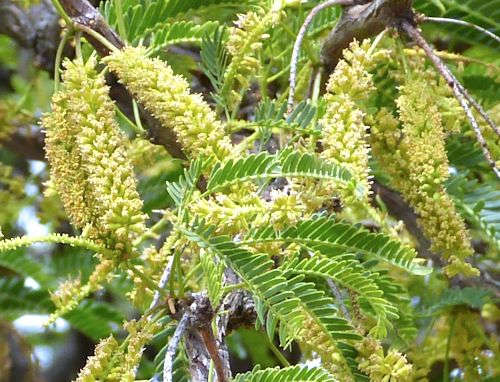Growing Neltuma x:
Hybrid Mesquite
Back to Trees and Palms
Description
Form: Tree.
Leaf retention: Semi-evergreen in regions without freezes. Deciduous in hard freezes.
Growth rate: Rapid.
Mature Size: 20-40' (6-12m) high and as wide.
Flowers: Yellow to cream colored, small, bottle brush shape.
Bloom: Spring.
Fruit: A seed pod, flat and curved, compressed around its seeds, sometimes with rolled edges.
Leaves: Small dark green leaflets, closely spaced, with a feathery appearance. Some cultivars have dense crowns. This tree provides moderate to dense shade.
Stems: Thornless to thorny, depending on cultivar.
Roots: Nitrogen-fixing*, aggressive, shallow if near a lawn or watered only briefly.
Wildlife: The flowers attract bees.
Toxic / Danger: No.
Origin: South America.
Form: Tree.
Leaf retention: Semi-evergreen in regions without freezes. Deciduous in hard freezes.
Growth rate: Rapid.
Mature Size: 20-40' (6-12m) high and as wide.
Flowers: Yellow to cream colored, small, bottle brush shape.
Bloom: Spring.
Fruit: A seed pod, flat and curved, compressed around its seeds, sometimes with rolled edges.
Leaves: Small dark green leaflets, closely spaced, with a feathery appearance. Some cultivars have dense crowns. This tree provides moderate to dense shade.
Stems: Thornless to thorny, depending on cultivar.
Roots: Nitrogen-fixing*, aggressive, shallow if near a lawn or watered only briefly.
Wildlife: The flowers attract bees.
Toxic / Danger: No.
Origin: South America.
Cultivation and Uses
USDA hardiness zones: 8-11, depending on cultivar.
Heat tolerant: Yes.
Drought tolerant: Yes.
Sun: Full sun.
Soil: Well draining, dry, low in organic content, pH 6.6-8.5 (neutral to alkaline). *Do not use a nitrogen fertilizer.
Water after becoming established: Deep water every two months during drought. Always water past the drip line of the tree and away from the trunk to encourage lateral root development. Water encourages crown growth and mesquites without sufficiently wide roots can be blown over by strong winds. Do not water more than once every two months after it is established to avoid aggressive growth and yard litter.
Prune: In summer, remove the lowest branches to train into a tree. Also thin the crown by removing any inward- or downward-pointing branches. Do not prune more than 20% of the crown or root growth will be slowed. Without periodic thinning, heavy wind damage may occur. This can be a high maintenance tree.
Litter: Moderate to high, depending on cultivar.
Propagation: Seed.
Uses: Ornamental, low water (xeriscape) garden.
USDA hardiness zones: 8-11, depending on cultivar.
Heat tolerant: Yes.
Drought tolerant: Yes.
Sun: Full sun.
Soil: Well draining, dry, low in organic content, pH 6.6-8.5 (neutral to alkaline). *Do not use a nitrogen fertilizer.
Water after becoming established: Deep water every two months during drought. Always water past the drip line of the tree and away from the trunk to encourage lateral root development. Water encourages crown growth and mesquites without sufficiently wide roots can be blown over by strong winds. Do not water more than once every two months after it is established to avoid aggressive growth and yard litter.
Prune: In summer, remove the lowest branches to train into a tree. Also thin the crown by removing any inward- or downward-pointing branches. Do not prune more than 20% of the crown or root growth will be slowed. Without periodic thinning, heavy wind damage may occur. This can be a high maintenance tree.
Litter: Moderate to high, depending on cultivar.
Propagation: Seed.
Uses: Ornamental, low water (xeriscape) garden.
Comments
This tree is a member of the Legume family (Fabaceae). The scientific synonym for its genus is Prosopis. It is sometimes sold as Chilean Mesquite but that is a commercial name not related to the species from which it was developed. Several cultivars are bred by nurseries and vary in appearance and behaviour.
Do you have additional information or a different experience for these plants that you would like to share? Email info@GardenOracle.com. All contributions are welcome and appreciated.
This tree is a member of the Legume family (Fabaceae). The scientific synonym for its genus is Prosopis. It is sometimes sold as Chilean Mesquite but that is a commercial name not related to the species from which it was developed. Several cultivars are bred by nurseries and vary in appearance and behaviour.
Do you have additional information or a different experience for these plants that you would like to share? Email info@GardenOracle.com. All contributions are welcome and appreciated.



Latest update: July, 2024
© 2008-2026 by GardenOracle.com

